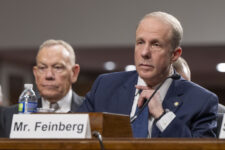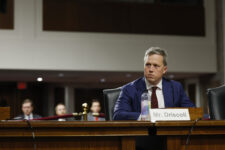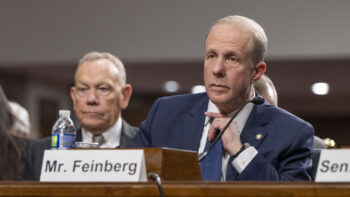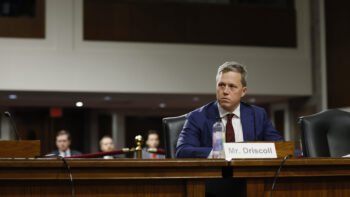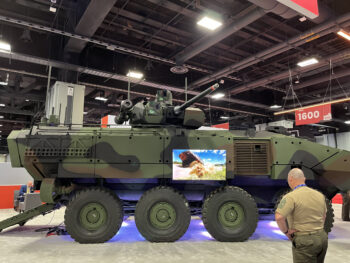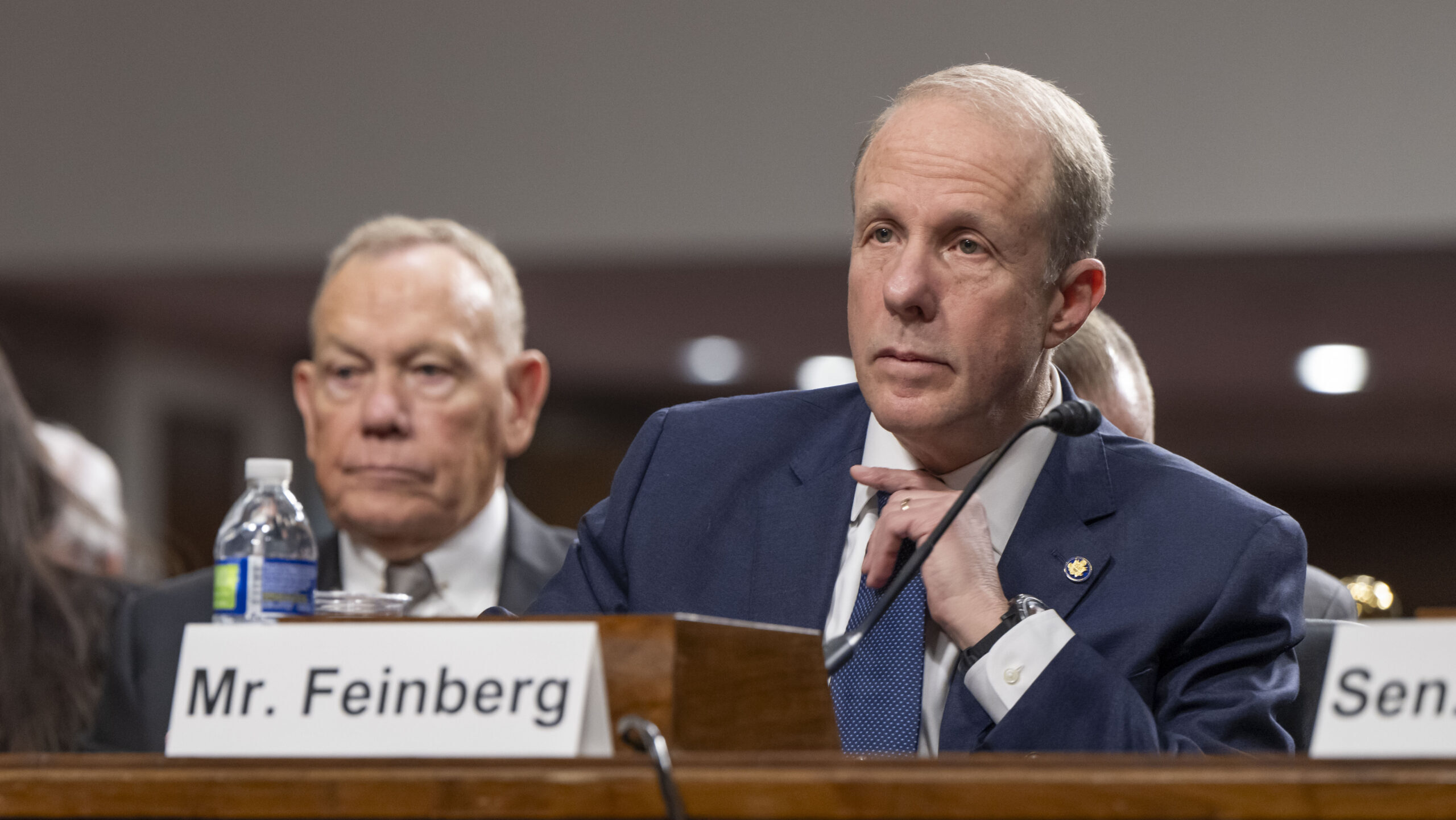
Nominee for Deputy Secretary of Defense Stephen A. Feinberg listens to the opening remarks of a Senate Armed Services Committee in Washington, D.C., Feb. 25, 2025. (DoD photo by U.S. Air Force Senior Airman Madelyn Keech)
WASHINGTON — President Donald Trump’s nominee for the Pentagon’s No. 2 job indicated his willingness to chop legacy programs and called for the department to more closely align itself with the private sector during his confirmation hearing today.
If confirmed as deputy defense secretary, billionaire investor Stephen Feinberg said he would bring his private equity chops to work at the Pentagon, driving greater efficiency and financial accountability, improving the defense acquisition process by increasing competition, and working to ensure the US military has the cutting edge technology it needs.
He listed shipbuilding, aircraft development, nuclear modernization, cyber defense, hypersonics, counterspace capabilities and counter-drone platforms as key technology “shortages” needed to beat China, which he called the biggest and most challenging threat the United States.
“China is the first nation we’ve ever competed with that has both a great economy and a great military. China’s entire private sector is fully committed in supporting that military development and as such, they effectively have unlimited funding,” he said during his opening comments in front of the Senate Armed Services Committee. “Not meaning to be too negative, but we really need to plug these shortages, focus on our priorities, get rid of legacy programs, be very disciplined, and while at the same time focusing on the economics.”
“If we do that, given America’s great innovative capability and entrepreneurship, we will defeat China,” he said.
Feinberg is the co-founder and CEO of Cerberus Capital Management, a private equity firm whose holdings have included defense companies such as hypersonic testing firm Stratolaunch and which has a 70 percent stake in tactical wheeled vehicle maker Navistar Defense, according to Cerberus’s website and news reports. Feinberg has not previously held a position in government, but during Trump’s last administration he headed the President’s Intelligence Advisory Board, which gives private citizens access to classified information so they can assess how the Intelligence Community goes about its normally cloistered business.
Trump tapped Feinberg for the deputy defense secretary job in late December, calling him “an extremely successful businessman.” Typically, the deputy is a largely managerial position, overseeing matters related to the Pentagon’s budget, workforce and its overall bureaucracy — thus leaving the defense secretary free to focus on overarching strategy, policy and political matters.
“There is great opportunity to improve our cost structure, our efficiency, our operations, to really save a lot of money that could be plowed into mission. We do not have great financial accountability, financial metrics or systems — [there’s an] awful lot of low hanging fruit there,” Feinberg said. “This is in my wheelhouse, hopefully. I spent a career helping organizations improve and after doing it so many years, I certainly made sincere mistakes, but … I think I can add some value there.”
The Pentagon could improve its supply chain by “working more closely with our private sector,” specifically by better understanding what drives their leadership boards or how they respond to shareholder pressure, Feinberg said. At a different point in the hearing, he said that the current acquisition system favors legacy defense contractors by incorporating “gold-plated” technical requirements and rigid regulations that holds commercial companies and nontraditional vendors back.
“[There’s] a lot we can do by getting into the program detail, line by line. My view is the deputy has to go program by program, line by line, not hand it off to somebody,” he said.
Throughout the hearing, Democrats interrogated Feinberg about a recently announced 8 percent spending cut — which Feinberg said would be reinvested inside the Pentagon to fund top spending priorities — as well as plans to the reduce Pentagon’s workforce by at least 5 to 8 percent.
“Over the weekend, [Defense] Secretary [Pete Hegseth] announced that 5,400 probationary employees would be dismissed, and it apparently was not done with any analysis, it was just preemptive,” said Sen. Jack Reed, the committee’s top Democrat. “You run companies. Have you ever walked in and fired thousands of people without any analysis for the costs or benefits?”
To this question, and other similar ones from other lawmakers, Feinberg stated that layoffs were necessary when restructuring an organization to become more effective.
“Every person is significant, and these cuts are always hard. But I believe that most of the cuts that we will see will be from people that want to retire, people who would like to resign early,” he said. “There’s obviously over 900,000 civilians in the in DoD so while you can never, you know, not take one person seriously in these kinds of reorganizations, there’s always turnover. And without some turnover, you can’t become an efficient organization.”
Feinberg offered few specifics about any plans for individual weapons programs.
After Sen. Deb Fischer, R-Neb., pressed the nominee on whether the nuclear deterrent was the Defense Department’s “highest priority mission,” Feinberg offered that “it might be,” but added that he wanted to receive classified briefings before answering that more directly. He later said that “there’s nothing that could be more important than our nuclear modernization,” but noted that “we also need hypersonics.”
And when about whether the US Air Force needs a sixth-generation fighter by Sen. Tom Cotton, R-Ark., Feinberg said it was a “controversial issue” and that he would offer his best advice to Hegseth — or even Trump, should the president get involved in the potential acquisition.
Last week, Sen. Elizabeth Warren, D-Mass., laid out concerns about Feinberg’s business dealings and financial interests in a 23-page letter sent on Feb. 17, which stated that his Cerberus holdings could pose a conflict of interest if not properly divested. (Warren did not ask Feinberg about this issue during the nomination hearing, instead pressing him on Cerberus’s ownership of several hospitals in her home state.)
“I have serious concerns about your qualifications and ability to take on the responsibilities of the role. You have serious conflicts of interest, with holdings in seven companies that do nearly $16 billion in business with the Defense Department,” she wrote in the letter.
“As the Deputy Secretary of Defense, you will have to look out for what is best for the Department and the nation, not private backers, shareholders, or companies in your portfolio,” Warren said later in the letter.
In ethics documents submitted on Feb. 18, Feinberg said he would “divest all of my interests in Cerberus including, but not limited to, my equity interest, carried interest, incentive fees/allocations, and capital commitments” prior to assuming the role of the deputy secretary of defense.
President Trump must use every tool to speed up arms for Israel
Blaise Misztal and Ari Cicurel in this op-ed argue that President Donald Trump needs to be willing to go around Congress to get arms to Israel more quickly.
